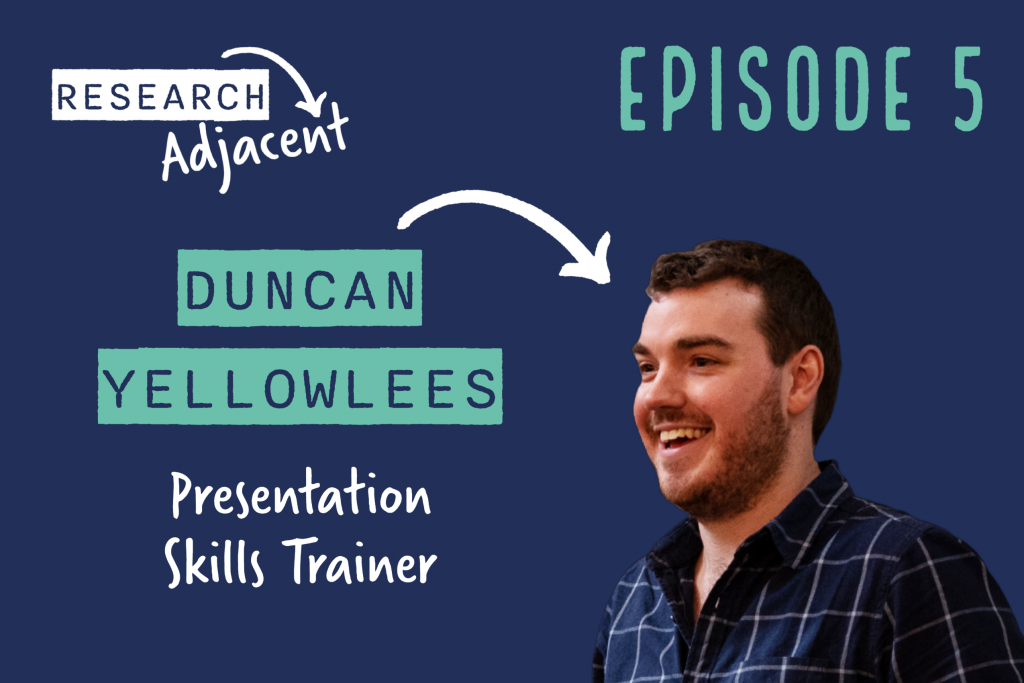Duncan Yellowlees, Presentation Skills Trainer (Episode 5) | Duncan talks about telling stories, building confidence and doing things differently

“And that confidence for me is the secret. You know, I can teach you to do good slides and stand up and wave your arms around in a way that is engaging. But once you start doing it, that confidence transfers into lots of other areas of your life.”
Telling stories
In this episode, Sarah’s guest is freelance presentation skills trainer Duncan Yellowlees. Duncan trains researchers to communicate better, helping them tell stories about their work, connect with different audiences, and collaborate more effectively.
The combination of an engineering degree and a passion for theatre meant Duncan initially aspired to be the Brian Cox of industrial heritage (there’s still time, Duncan!). Initially he found a way to combine these skills in writing educational science centre shows and training presenters, before deciding to go freelance 5 years ago. Duncan business has really taken off since he figured out his niche of teaching presentation skills to students and academics.
Permission to do things differently
As two freelancers we talk a lot about the challenges of running your own business including loneliness, networking, and imposter syndrome. But these are all things that will be familiar to researchers too – as Duncan points out “Research is quite like being a freelancer. The way it works in the self-promotion, and the working things up and, you’re on your own building a personal brand, essentially.”
Despite the importance of personal brand to researchers, Duncan despairs at how academic conference culture has sucked all the fun out of sharing their work. He wants to find ways to make conferences more rewarding by providing permission, and confidence for people to do things differently.
“Part of the problem, I think, is that there’s very little space for creativity and fun. So you take this whole group of bright, wonderful, interested, passionate, creative people and force them to do things a certain way, and condense information into very dry, detail-orientated things.”
A COMMunity for communication skills
“We’ve got people who a year ago would burst into tears when they got up on a stage who now are volunteering to do talks, and doing their first undergrad lectures and things, and getting through it and feeling more confident.”
Seeing researchers, particularly PhD students, build their confidence and find their voice is clearly his most rewarding part of his job. To help him support people over the longer term he has recently built a community, called COMMunity, for anyone who wants to keep developing their skills. And as Duncan points out, building better communication skills make everyone not just more confident but more employable too.
“So often communication skills get put into focus only as part of public engagement or as outreach work or impact, whereas it should be a core part. You know, it’s in every survey anybody ever does about what are the skills that the workplace and industry needs. Communication skills are in the top five every single time. It should be a core part of the training and valued as such, but it’s not.”
Training and tinkering
Still an engineer at heart Duncan, besides communication skills we also talk about making things. One of Duncan’s proudest achievements is inventing the Wobbler. The Wobbler is a DIY lolly-stick pendulum which has since been featured in books and videos of make-at-home science projects. He also hand-crafts kitchen knives in his spare time.
Find out more
- You can find out more about Duncan on his website, and you can connect with him via Twitter and LinkedIn
- Sign up for Duncan’s Presentation Skills tips via email
- COMMunity – Our Community — Duncan’s community for communication skills support
- How to make your own Wobbler
- Jeni Smith and NetKno
- Hana Ayoob
- Sarah Cosgriff
Theme music by Vitaliy Levkin from Pixabay
How was it for you…?
This is a bit of an experiment so I would genuinely appreciate feedback about the podcast. Suggestions for future guests are always welcome too, please drop me an email.
Sign up for episode notifications
If you want to be the first to hear new episodes then please subscribe in your favourite podcast app or sign up below for email notifications.